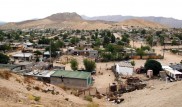Four days ago, the Independent Media was ablaze with reports of possible border crossings by ISIS into the United States. I yawned and then went back to bed. This is old news and many in the Independent and the Maintream Media are acting as if this is some kind shocking new revelation.
Will the Real ISIS Please Stand Up?
This article is about the terrorist network that the Russians have managed to put together which is ravaging the CIA backed ISIS in Syria. However, in North America, the following documentation will clearly illustrate that ISIS is closely allied with the same terrorist groups that is wiping out ISIS forces in Syria. This should make everyone do a double take and scratch their heads. Will the real ISIS please stand up?
The documentation which demonstrates that Russia is allied with terrorist organizations as well as the Iranian military to preserve Assad’s reign over Syria is thorough. In Syria, Russia is obliterating ISIS in Syria. However, the documentation that ISIS and their terrorist allies are coming across the border in force is convincing. How can ISIS be a part to both sides of this fight on a global scale? Simple, ISIS is run by the CIA and the CIA has their own set of agendas. It is amazing to me that this duplicity in the running of ISIS is not widely being commented on.
The Texas Rangers Have Been Preparing for An ISIS Onslaught for Months
As the MSM pretends to be shocked with revelations of an intricate terror network entering the United States, I would be laughing out loud if the situation and implications were not so dire as the Washington Times reported,
“When asked at the annual Texas Border Coalition meeting if any suspected Islamic State terrorists had yet infiltrated the border, Steven McCraw, director of the Texas Department of Public Safety replied, “Individuals that come across the Texas/Mexican border from countries with a known terrorism presence and the answer to that is yes.” Well, Russia is allied with terrorists in Syria and by default in North America.
Six months ago, I was contacted by a member of the Texas Rangers who sent me an email which told me that the Texas Rangers were preparing for a massive ISIS incursion into the United States and the infiltration was already underway. Here are excerpts to this communication.
Hello Mr. Hodges,I have been a Texas Ranger for quite some time, and as such, I am privy to much of what is going on with regard to the Midland Walmart store closing, the presence of ISIS on Texas soil and our preparations to combat an insurgent threat.I will not give you my rank or location because it would not be safe to do so. It is a waste of time to try and trace the IP#, etc., as I have taken steps to ensure that this note cannot be traced back to me. I understand and realize that you seem to have a growing issue with people who will not go on the record with their inside knowledge or first-hand observations, but you cannot understand the pressure and scrutiny that some of us are under. I am taking a big risk writing this email to you.The main reason that I am writing to you is to encourage you to keep writing on the growing threat of infiltration in Texas and I suspect other states as well. The infiltration I am writing about is not just Special Forces that are going to conducting covert drills in our state. that is concerning and I agree with you this involves martial law. For now I am talking about ISIS and the danger that they pose to all of us. Our intelligence indicates that they have enough manpower & firepower to subdue a small town. The Midland Walmart takeover by DHS is a national security move in which we have been told falls under the Continuity of Government provisions. The Threat Fusion Centers are providing related information on what it is we are facing but the information sharing is only in one direction and that is very concerning.We expecting an attack on more than one Texas city or town by ISIS and/or any of their partners. I believe the information to be accurate. However, this makes the covert operations of groups like the Navy Seals and others under JH15 highly suspicious. We do not need the insertion of Special Ops into Texas towns and cities. I think that you are probably right about the intention of arresting political undesirables given what we know about JH15. I am of the opinion that whatever the mission objectives of JH15, they have nothing to do with the immediate threat. Therefore, I do not pretend to understand the full scope of JH 15 because there are unfolding operational details which are almost impossible to reconcile with what I already know to be fact based the evidence for what is going on…I wanted to tell also you that we believe that Pantex is a high value target for ISIS and much or our preparation is to thwart any action by terrorists against the facility. I am wondering how in the hell you figured that out. Someone on the deep inside must be talking with you……We will have to see where this is going but I have a bad feeling.You do your job and keep writing and I will do my job in upholding the ConstitutionThank You
Russia Is Building a Coalition of America’s Enemies In Syria to Fight Against the CIA Supported ISIS
Yesterday, it was announced that Iran, Russia, Hezbollah from Lebanon, and even Iraq have united with Syria’s Bashar Al-Assad to defeat the CIA backed ISIS in Syria. Further, Reuters is reporting that hundreds of Iranian troops have come into Syria. The Chinese are joining the fight. This cannot be resonating with Israel.
Click this link to listen to former Special Operations Officer, Scott Bennett, establish that the CIA formed and is funding ISIS, with help.
Judicial Watch, Hamas, Hezbollah, Russia and ISIS
Informed Americans were stunned when they learned, in April of 2015, of the presence of an ISIS camp eight miles from El Paso, TX. Judicial Watch connected ISIS to the Mexican drug cartels. As I previously reported, Hamas and Hezbollah are connected to the cartels. The proof is incontrovertible.
Back in 2010, an internal memo was leaked from the Tucson Police Department. which stated that Islamic terrorist groups are commencing operations in Mexico and forming alarming ties with the country’s brutal drug cartels. In turn, the drug cartels are now associated with Hezbollah and ultimately their partner, Hamas. The memo also references a large weapons stockpile in Mexico as evidenced by the 2010 Tijuana arrest of Hezbollah militant Jameel Nasr, who was given the job of establishing a well-armed Hezbollah network in Mexico and South America. Nasr was apparently bringing this terror network north when he was captured. The memo also discussed the April 2009 arrest of Jamal Yousef in New York, which exposed a huge cache of assault rifles, hand grenades, explosives and anti-tank munitions. According to the report, the weapons were stored in Mexico, but only after being smuggled from Iraq by members of Hezbollah. This leads me to wonder if this was not a part of Fast and Furious. As a temporary aside, where do you think ISIS is getting its weapons? The preceding references contained in the Tucson Police memo does seem to answer that question.
The memo further warns that there could be dire consequences due to the new level of cooperation between Hezbollah and Mexico’s drug partnerships and this could be disastrous given Hezbollah’s advanced and new weapons capabilities. The report goes on to state that some Mexican criminal organizations have started using small IEDs which is clearly illustrative of the use of car bombs which is a hallmark trait of Islamic terrorists. IED’s are clearly the least of our worries with regard to the increased influx of MS-13 terrorists.
For the past nine years, the United States government has acknowledged the fact that Hamas and Hezbollah have strong ties to the Mexican drug cartels. We also know that Hamas, Hezbollah, al-Qaeda and the Muslim Brotherhood have partnered with the CIA in the formation of ISIS. And at the top of this pyramid is Russia. If you do not believe me, look at what is happening Syria!
The Cuban Missile Crisis Revisited
During the height of the Cuban Missile Crisis in which Russia has installed offensive nuclear weapons inside of Cuba, President Kennedy proclaimed that any attack upon the US and her allies emanating from Cuba would be considered to be an attack upon the United States by Russia. History has come full circle. Russia is repeating history. They are sponsoring a terrorist-based, Russian-led invasion of Syria. Meanwhile, back home inside the United States, Russia is sponsoring a paramilitary terrorist confederation inside of Mexico in which members are entering our country in great numbers.
THESE TERRORIST ORGANIZATIONS ARE ALL ALIGNED WITH THE RUSSIAN INVASION OF SYRIA. THESE TERRORIST ORGANIZATIONS ARE CROSSING THE SOUTHERN BORDER OF THE UNITED STATES IN GREAT NUMBERS.
ANY ATTACK UPON THE UNITED STATES BY TERRORISTS SHOULD BE CONSIDERED TO BE AN ATTACK SPONSORED BY THE RUSSIAN GOVERNMENT
Over the past two years, I have accumulated massive amounts of detail from sources out of the military, the State Department, the DEA. I am 100% confident in my data and the veracity of my sources.
This article merely skimmed the surface of the present crisis that will soon engulf many Americans. In one article, I cannot possibly cover the depth of information that I have accumulated which paints a very clear picture of our future. Subsequently, I am happy to appear on talk shows around the country in order to dispense this information in detail. I am going to expanding my media reach in the next several weeks. Before Its News, will be sponsoring and carrying the Red List News, which is a brief daily broadcast of the day’s major new events that Jim White and I have developed and implemented several weeks ago. Further, I am close to coming to terms with six terrestrial stations on the East coast to broadcast once per week over a seven state area. Exposing this gigantic fraudulent terrorist network and its connections to Russia will be a primary focus of my expanded media efforts. The Obama administration must be exposed for what they have done and what they are preparing to do.



















